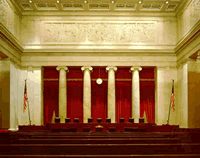Ziglar v. Abbasi Decided - Are Government Officials Liable for Damages? - Podcast
International & National Security Law Practice Group Podcast

Ziglar v. Abbasi is the result of over a decade of remands and appeals. The case was originally filed by the Center for Constitutional Rights on behalf of incarcerated Muslim, South Asian, and Arab non-citizens who were targeted after 9/11 by law enforcement as “terrorism suspects.” The defendants in the case, high level officials in the Bush administration, such as Attorney General John Ashcroft and FBI director Robert Mueller, and low level detention officials, filed a motion to dismiss, which was rejected by the in the District Court.
In 2009, the Supreme Court decided in Ashcroft v. Iqbal that government officials were not liable for discriminatory actions of their subordinates without evidence they directly ordered the actions. Meanwhile, five of the petitioners in Ziglar settled with the government, and the case was remanded to the District Court and amended. In 2010, the District Court granted a new motion of dismissal, but only for the high level officials. This dismissal was reversed by the Second Circuit.
The main question the Supreme Court answered was whether these high-level government officials could be sued for damages under the Bivens precedent. The precedent, created in a 1971 case involving the Federal Bureau of Narcotics, created an implied cause of action for any person whose Fourth Amendment rights are violated by federal officials. On Monday, June 19 the Supreme Court refused to extend the Bivens precedent to the petitioners, reversing the decision by the Second Circuit and remanding the case.
David Rivkin of Baker Hostelter joined us to discuss the opinion and its significance.
Featuring:
- David B. Rivkin Jr., Partner, Baker & Hostetler LLP






